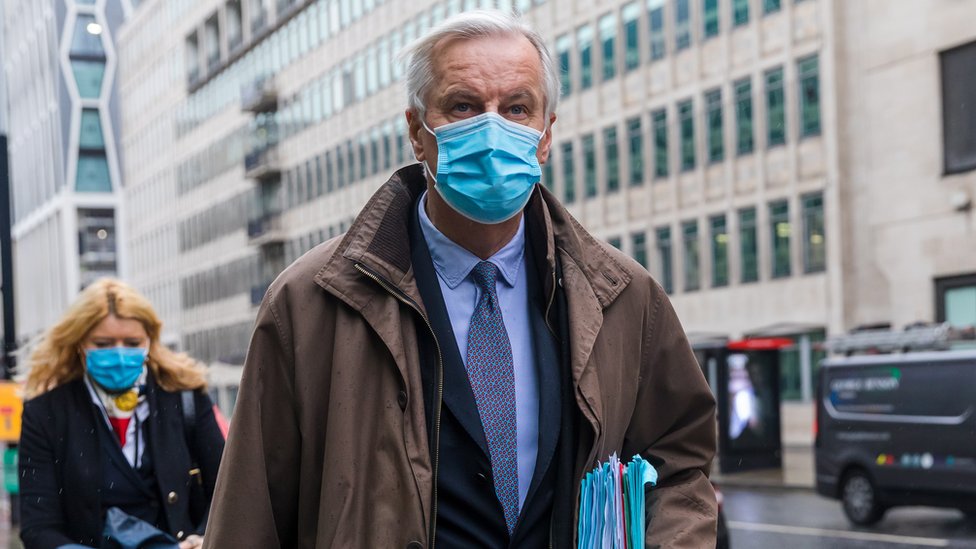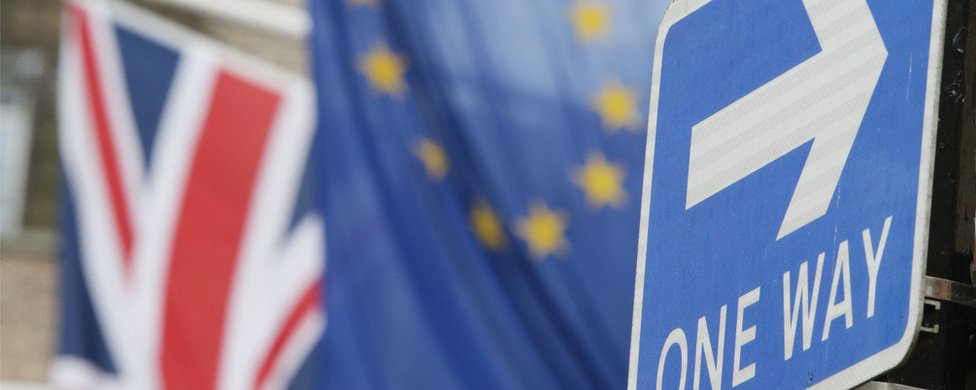Brexit: UK-EU trade talks down to the wire

Talks went on late into Wednesday evening at the business department in central London.
The two sides are urgently seeking compromises in key areas before current trading rules expire at the end of December.
Fishing rights, competition rules and how an agreement should be enforced remain outstanding issues.
The two sides have been locked in talks since March to determine their future relations once the UK's Brexit transition periods ends on 31 December.
Ireland's foreign affairs minister said there was a "good chance" a deal between the two sides could be agreed in the coming days.
'Absolutely committed'
Speaking to Ireland's Newstalk Radio, Simon Coveney said the EU needed to "hold our nerve" and trust its chief negotiator Michel Barnier.
"I believe if we do that, there's a good chance that we can get a deal across the line in the next few days," he added.
Boris Johnson has said the UK remains "absolutely committed" to "getting a deal if we can".
Speaking on Wednesday, the prime minister said the EU side "know what the UK bottom line is," as talks continued in what is seen as a crucial week.
Negotiators got back to work in London on Thursday morning - face-to-face talks have been ongoing since the weekend after a week-long pause.
Discussions had to move entirely online after Mr Barnier was forced into self-isolation after one of his colleagues tested positive for Covid-19.

Brexit - The basics

- Brexit happened but rules didn't change at once: The UK left the European Union on 31 January 2020, but leaders needed time to negotiate a deal for life afterwards - they got 11 months.
- Talks are happening: The UK and the EU have until 31 December 2020 to agree a trade deal as well as other things, such as fishing rights.
- If there is no deal: Border checks and taxes will be introduced for goods travelling between the UK and the EU. But deal or no deal, we will still see changes.

Pizzas were delivered to a central London venue late on Wednesday evening, as the two teams continued to haggle over the details of a deal.
Fishing rights have been a key stumbling block in the talks and have continued to be a major issue as negotiations enter their endgame.
Labour's position
The two sides are continuing to haggle over how much access European fishing boats should have to British waters, and how much they would be allowed to catch from next year.
They are also at odds over how closely the UK should have to follow the EU's social, labour, and environmental standards after the transition.
Negotiators are also seeking to agree how commitments in the deal should be enforced - with the EU seeking a robust regime for resolving disputes.
On Sunday, Labour leader Sir Keir Starmer said his party would either decide whether to vote for or abstain on any deal after examining the final contents.
He added that he was "listening to a number of different views on it" - adding that he didn't think the was "much of a case" for voting against.
It has been reported that the Labour leader - who campaigned for another EU referendum - is planning to ask his MPs to back the deal, but some members of his shadow cabinet would prefer to abstain.
The government has not confirmed how it intends to ratify a deal in Parliament.
But the UK's chief negotiator Lord David Frost has said he assumed MPs would have to approve a law to implement "at least some elements" of a deal.

December 04, 2020 at 12:17AM
https://www.bbc.co.uk/news/uk-politics-55171563
Labels: BBC News

0 Comments:
Post a Comment
Subscribe to Post Comments [Atom]
<< Home